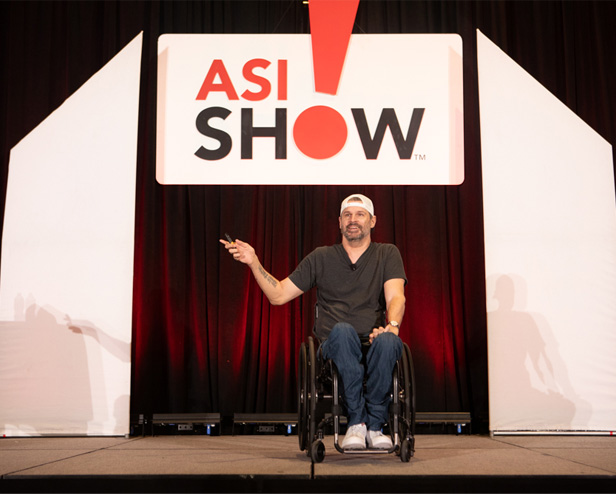Strategy April 01, 2025
ASI Fort Worth 2025: Torsten Gross Delivers Marketing Motivation in Energizing Keynote
For Gross – a competitive race car driver, marketing executive and C6 quadriplegic – finding success is all about embracing both failure and our biggest weaknesses.
“I am here,” Torsten Gross told a room full of distributors to kick off the third day of ASI Fort Worth, “because I am a huge failure.”
The opening words of his keynote were much like Gross himself: anything but conventional.
He has had a long career as a marketing executive in addition to his other pursuits as a competitive race car driver, rescue scuba diver and marathoner, and also happens to be a C6 quadriplegic.

With his keynote at ASI Show Fort Worth, Torsten Gross hoped to motivate attendees to fail – which, he said, can only come on the other side of trying.
A diving accident at the age of 15 left Gross with a broken neck shattered into 36 pieces and limited functionality of all muscles below his shoulders. Since then – which, again unconventionally, Gross calls one of his best days – he’s spent his life stubbornly resisting the word “no” and learning from the many, many failures that resulted.
“Failure is something I expect,” Gross said. “If I don’t crash, if I don’t fail in business, if I don’t do XYZ, then I’m not trying.”
He’s been fired from multiple jobs. It took trips to seven dive shops to find one that would even let him attempt to get his rescue scuba license after taking one look at him in his wheelchair. The first time he got behind the wheel of a hand-controlled race car, the car went into total brake failure at 120 miles an hour – an incident that would have caused most people to stay as far away from high-speed driving as possible.
Instead, Gross bought his own race car.
Torsten Gross joined ASI Media's Hannah Rosenberger after his keynote speech at ASI Fort Worth to discuss how he brands himself – and how he thinks about the relationship between fear and failure.
“The car doesn’t care that I’m in a chair,” Gross said. “People on the track don’t know that. It is the only sport on the planet that makes somebody in a chair equal to able-bodied people.”
That’s what has motivated him to keep racing, and what has helped to manage the fear that can come from such a high-speed, dangerous sport.
That’s right: fear. Despite his penchant for thrill-seeking activities like racing, Gross admits that he’s someone who is terrified of everything.
It’s what he considers his biggest weakness. And while Gross also has the physical limitations of a wheelchair to manage, he believes that everyone has a so-called metaphorical wheelchair.
“We all have something that holds us back and lets us think that we can’t keep moving forward,” Gross said. “That’s your wheelchair.”
It’s not always physical – Gross cited other examples like mental health challenges or even a bad breakup as experiences that can serve, at least initially, as barriers to success. But where conventional societal wisdom often says that our biggest strengths can be our biggest weaknesses, Gross prefers, as with most things, to flip the script.
He believes that your biggest weakness is what turns into your biggest strength.
Earlier this year, Torsten Gross appeared on the Promo Insiders podcast to preview his ASI Show Fort Worth keynote with insights into how to find a “superpower” within what’s often perceived as a weakness.
In his case, he always tells himself that confidence, in many ways the opposite of fear, can only come on the other side of trying. That’s why he sets impossible goals for himself and then tells everyone – before he has any idea how to accomplish them. And it’s why he places such high value on failure as a metric of ultimately reaching success.
Gross encouraged attendees, then, to discover their own “wheelchairs” and subsequent superpowers – especially from a branding standpoint. Finding the “one-liner” that sets a business apart from its competitors is crucial, especially in an industry like promo where companies often have access to the same or similar products, Gross said.
“I’d rather stay true to my perspective because I want to be something to somebody – I don’t want to be everything to everybody,” he said. “So, make a statement and commit to it, because that’s how you build loyalty.”
